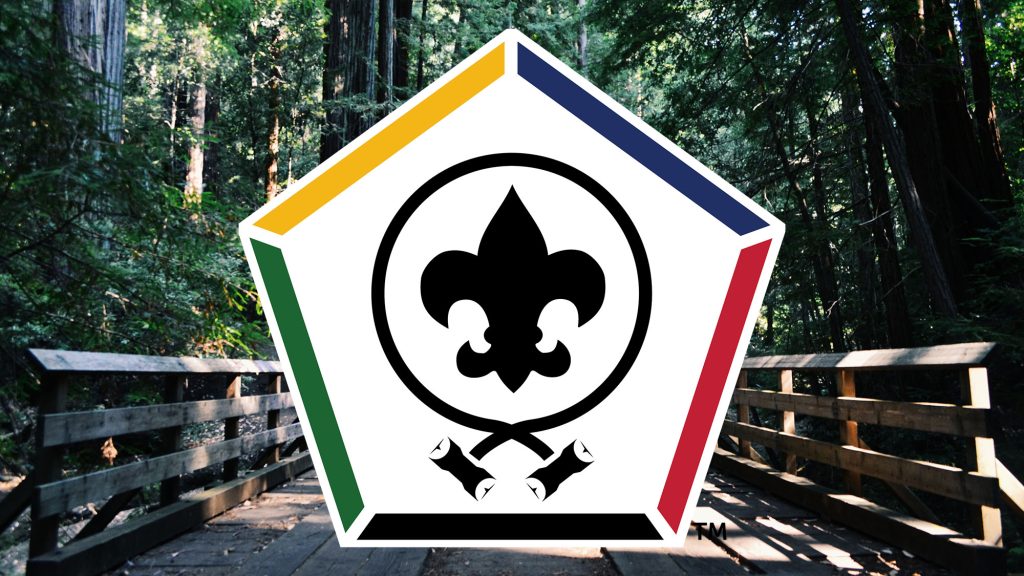Wood Badge is an advanced, national leadership course open only to Scouting volunteers and professionals.
Scouters from Cub Scouting, Scouts BSA, Venturing, Sea Scouts, and Explorers, and district and council Scouters all are welcome and belong here.
What is Wood Badge?
Reflecting the best of nearly a century of Scouting experience, Wood Badge draws upon the most current leadership models used by corporate America, academic circles and successful organizations throughout the country.
Wood Badge training was begun by Baden Powell in 1919 as a way to insure that the leaders of Scout troops were properly trained. Since then Wood Badge has been held worldwide, providing advanced leadership training to thousands of Scout leaders.
Wood Badge builds upon the best traditions and experiences of the Boy Scouts of America and also draws from a wide range of courses within and beyond the bounds of Scouting to present the latest in leadership theory and team development.
Who Should Attend?
Wood Badge is designed to meet the advanced leadership needs of all Scouters, particularly unit level Scouters, such as Cub leaders, Scoutmasters and assistants, Venturing Crew Advisors, Committee Chairs and members. Additionally Scouters serving at the district and council levels can achieve greater effectiveness through Wood Badge.
To attend a Wood Badge course, individuals must:
Be registered members of the Boy Scouts of America. (Youth 18 and older may attend as long as the appropriate Youth Protection guidelines are followed. They do not need to be registered in an adult leadership role.)
Have completed the basic training courses for their Scouting position.
Be capable of functioning safely in an outdoor environment. All participants are required to complete the Annual Health and Medical Record form.
Why Attend?
By taking Wood Badge, Scouters will acquire valuable tools such as listening, communicating, conflict management, project planning and leading change. Participants will better learn to understand and appreciate diversity and differences in our society. They will learn skills that will make them a better Scout leader. Units with trained leaders are able to deliver an improved program and a more meaningful experience for the youth Scouting serves.
By attending Wood Badge, the participants will internalize the 5 themes of Wood Badge: Living the Values, Growing, Connecting, Guiding, Empowering.
These come to you in presentations, games, discussions, activities, and other methods.
Why do you want to go?
You want to participate in a Wood Badge course because of things you will learn and do. Here are some of the benefits:
Stronger units. You will make your Scouting unit — and your sons’ and daughters’ units — stronger.
What and why of Scouting. You will have a deeper understanding of what Scouting is and why we do it.
Experience. You will learn and experience things that will stay with you in Scouting and the rest of your life.
Fun. You will have fun and you will meet interesting people.
Other groups. You will make your other groups, like work, church, even family, stronger.
Here’s another summary of why to go. This was originally aimed particularly at Scouters in the Cub Scout program, but it applies equally to all of us.
CUB SCOUT LEADERS! How would you like to attend a training that takes you far beyond your Basic Leader Training? Would you like to build your skills in communication, conflict management and teaching methods? How about a leadership course that rivals many corporate level trainings?
Wood Badge is here for you. This is not a Troop leader training but is designed for Cub, Scouts BSA, Sea Scouts, and Venturing leaders. This course will help you better understand how all the Scouting programs tie together. It will provide you with many useful leadership tools to help enable our youth to have the best possible Scouting experience. There is no better time to attend a Wood Badge course and make a difference in your unit than NOW.
Tickets
Have you heard of “The Ticket” and wondered what it is? The ticket is a group of five goals you set for yourself to do after course, to improve your unit. You learn more about this on the course.
Although the course is different today, what Baden-Powell said in 1919 still applies:
One of the purposes of Wood Badge training is to get Scouters to think about the practice of Scouting, to meet together, to exchange experiences, and to live together in the spirit of the Scout Oath.

